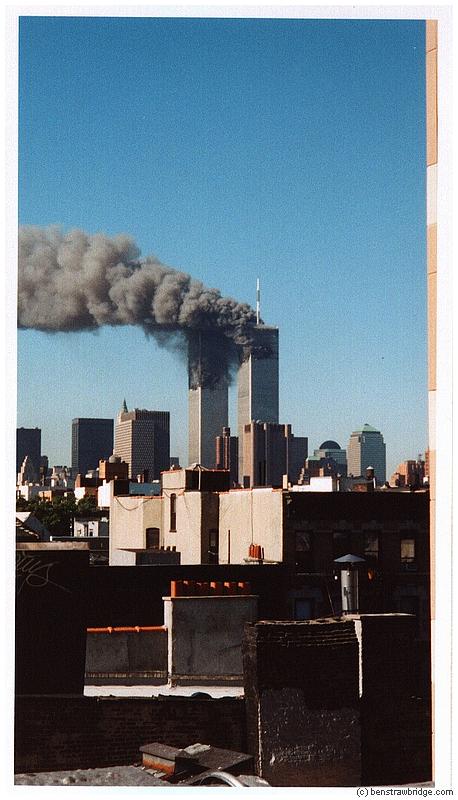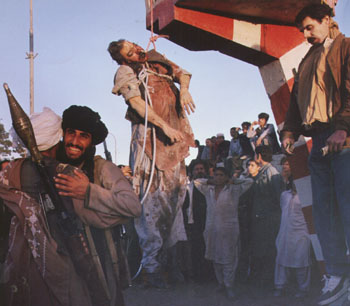History Shows, the United States is Not Anti-Muslim
Why is it that the United States, despite its apparently reasonable intentions, is so successfully demonized by its adversaries in the Muslim world? According to this op-ed article from Pakistan's Dawn newspaper, the reasons are partly rooted in history, and partly due to the al-Qaeda 'Frankenstein' Washington created to battle the Soviets in Afghanistan.
By Shahid M. Amin*
May 18, 2006
Pakistan - Dawn - Home Page (English)

 Pakistani Muslims Express Their Hatred for the United States.
Pakistani Muslims Express Their Hatred for the United States.
Is Such Hatred Warranted, Given the Historical Record? (above).
September 11: A Day that Irrevocably
Altered the Course of History. (below).
 ---------------------------------------------------------------------------
---------------------------------------------------------------------------
IT is becoming increasingly apparent that the Islamic world is
passing through a period of crisis, which is both external and internal.
Externally, there is a growing distrust, which is developing into an actual or
potential clash, between Muslim countries on the one side, and the West,
particularly the U.S., on the other.
The internal crisis in the Islamic world can
be seen in the growing cleavages of Muslim societies, and which is assuming the
shape of a battle for the soul of Islam. A relentless struggle is taking place within
Islamic societies between the traditionalists and extremists on the one side,
and the moderates and modernists on the other.
It is also notable that the external crisis is
fuelling the internal crisis, and vice versa. Moreover, the crisis has now
acquired global dimensions, particularly after September 11. The future of the
Muslim world is at stake, and it is important for all Muslims to make a close
study of this phenomenon as dispassionately as possible with a view to
separating myth from reality.
First, let us examine the external dimensions
of the crisis, which is perhaps taking shape as a clash of civilizations. Here,
one must look back into history to understand the nature of the crisis. The
historic record suggests that by and large, Islamic countries did coexist
peacefully with non-Muslims. The Ottoman Empire [Turkey] had formed alliances
with Christian countries, and this was also the case with many Muslim rulers in
India. Within Islamic states, Muslims were generally tolerant of those not of
their faith and living inside their countries.
For instance, Muslims ruled India, Spain,
Greece, Yugoslavia and Bulgaria for five centuries or more. But at the end of
their rule, these countries continued to have large non-Muslim majorities. On
the other hand, when Muslim states in Spain and Crimea were reconquered by the
Christians, Muslim populations were quickly and almost totally annihilated.
During the Middle Ages, many Jews found sanctuary in the Muslim world as they
fled persecution in Christian Europe. Muslim rulers often appointed Jews (and
Christians and Hindus) to important positions in their administrations. The
best Jewish religious literature was written by scholars living in Muslim
countries like Egypt, Turkey and elsewhere. Muslim tolerance had as its source the
teachings of the Holy Quran, where one surah [chapter] states, "there is no
compulsion in religion," and another surah says "to you your religion and to me
mine."
The Holy Prophet (PBUH) signed his first peace
treaty with the Jews of Medina. In the golden period of Islam from the 8th to
16th centuries, Muslims excelled in science, philosophy, the arts and
literature, taking inspiration from the writers of ancient Greece, Rome and
India. They developed a truly holistic civilization.
The Muslim began in the 16th century,
as Muslim societies lost their vibrancy. From the 18th century onward, the
decline in Muslim political fortunes accelerated, when the Ottomans  in Europe and the Mughals
in Europe and the Mughals  in India lost
ground. Distrust between Muslims and European Christians, which had taken root
during the Crusades, increased during the Ottoman domination of East Europe
from the 14th century onward. The rise of the West after the 17th century saw
European powers taking global control as imperialists and colonialists. In this
period, Muslims lost ground mainly to European Christians. This is a key reason
for the simmering Muslim resentment against the West, which has now come out into
the open.
in India lost
ground. Distrust between Muslims and European Christians, which had taken root
during the Crusades, increased during the Ottoman domination of East Europe
from the 14th century onward. The rise of the West after the 17th century saw
European powers taking global control as imperialists and colonialists. In this
period, Muslims lost ground mainly to European Christians. This is a key reason
for the simmering Muslim resentment against the West, which has now come out into
the open.
In more recent times, the loss of Jerusalem and
the implantation of Israel into the heart of the Arab world turned Muslim and
Arab anger initially against Britain and subsequently against the United States,
which assumed the mantle of Israel's protector. The Palestinian issue has been
and continues to be a festering wound on the Muslim body politic. More than any
other cause, this has generated Muslim anger and resentment against the West.
 Afghans Who Collaborated With
Afghans Who Collaborated With
the Soviets Hung By Mujahideen in 1980.
-------------------------------------------------------------------------
Paradoxically, the Soviet occupation of
Afghanistan also contributed toward the growing chasm between civilizations.
For geostrategic reasons and as a part of its own rivalry with the Soviet
Union, the U.S. decided to support the Muslim Jihad against Soviet occupation in
Afghanistan. However, an unintended consequence of this Jihad was that Islamic
extremists and fundamentalists gained strength and have made Afghanistan their
sanctuary and training ground ever since.
I was Pakistan's ambassador to Moscow during
the 1980s and remember well the Soviet warning that these Islamic
fundamentalists, who were being nurtured by the U.S. and Pakistan, would at
some point turn against the latter. It is evident that the jihadists have
emerged as a kind of Frankenstein and that now threatens to destroy their creators.
Osama bin Laden and the al-Qaeda, apart from the Taliban, are very much a
product of the Afghan war.
Their anti-U.S. campaign began around 1995,
when U.S. facilities in Saudi Arabia were attacked and some damage was done to
the World Trade Center in New York [bombing in 1993]. This was followed by the
bombing of two U.S. embassies in Africa, in which hundreds of African
bystanders were killed, followed by an attack on an American ship in a Yemen
port [the USS Cole]. Then came the horror of September 11, which really changed
the course of world history.
To take revenge for September 11, the U.S. and
its allies attacked and occupied Afghanistan in late 2001. But this didn't
ended the fighting in Afghanistan, where the Taliban are now staging something
of a comeback. Similarly, the al-Qaeda network has been weakened, but has
survived the American-led onslaught.
The American military invasion of Iraq in
2003, carried out on the pretext that the Saddam regime possessed weapons of
mass distinction, reinforced the belief that the United States is targeting one
Muslim country after another. This perception has brought new recruits into the
ranks of al-Qaeda, the Taliban and other militant groups. These Islamic
extremists are in the forefront of the guerilla warfare against the occupation
forces in Iraq. The growing possibility of an American attack on Iran, in order
to prevent it from developing a nuclear weapons capability, will further
inflame the situation and radicalize Muslim public opinion.
It is also worth noting that the Islamic
extremists are currently engaged in a relentless hate campaign, and have sought
to demonize the U.S. in every possible way. Since September 11, the extremists
have taken advantage of Muslim anti-Americanism, in which even the more
moderate have joined, to paint an unbalanced and one-sided interpretation of
events.
Any objective analysis would refute the misconceived
notion that the U.S. has an anti-Muslim policy. By taking military action
against Yugoslavia In the 1990s, it was the United States that secured the
liberation of oppressed Muslims in Bosnia and Kosovo. The emergence in 1991 of
six independent Muslim states in Central Asia was the outcome of the collapse
of Soviet communism, which had been opposed tooth and nail for decades by the United
States.
In the Middle East, it was the U.S. that forced
Israeli withdrawals from Sinai, both in 1956 and 1978. The return of the PLO to
the West Bank after the Oslo accords in 1993 was due largely to American
efforts. In our own region, according to authoritative accounts, it was the U.S.
that saved West Pakistan from an Indian invasion after the surrender of
Pakistani troops in Dhaka in 1971. Similarly, when there were fears of war between India and Pakistan in 1999 and
again in 2002, it was the U.S. that played the central role of mediator to
dissuade India from any kind of military adventure. Continued U.S. diplomatic
and economic support has always been and remains a key element in Pakistan's
quest for security against India.
As for the American invasion of Afghanistan,
it was the al-Qaeda, operating from safe havens in that country, that first
attacked the United States, and not the other way around. The U.S. attacked
Afghanistan to dismantle the terrorist network there, and not as part of any
global plan to conquer a Muslim country. Afghanistan is an impoverished country
and there is no evidence that the U.S. has exploited any of its negligible
resources.
Moreover, the Taliban regime was very isolated
and was disliked even by its immediate Muslim neighbors, including Iran, which
at one time threatened to go to war against it. It is a fact that the Taliban
regime was practicing a narrow-minded version of Islam that was anti-women,
anti-entertainment and anti-education. Its ouster has been welcomed by large
sections of Afghan society, and above all, by Afghan women, who had been
virtually under house arrest during its rule.
But the U.S. invasion of Iraq that followed in
2003 has been rightly condemned by most observers as a unilateral use of force
based on false pretexts. Its real objective was the ouster of the Saddam
regime. However, it's worth noting that a recent poll in Iraq shows that nearly
three-fourth of Iraqis approve of U.S. action to oust Saddam. The Shiite
majority had been badly suppressed by the Saddam regime, as were the Kurds, and
it is understandable that they would welcome the change. These two groups now
rule Iraq for the first time in its history.
 Kidnapped By Zarqawi: Many Innocent Foreigners Have Been Executed.
Kidnapped By Zarqawi: Many Innocent Foreigners Have Been Executed.
-------------------------------------------------------------------------------------
The resistance to U.S. military occupation appears
to be coming from Islamic extremists like Al-Zarqawi and foreign suicide
bombers. They have killed far more Iraqis than the U.S.-led coalition forces in
a ferocious guerilla war in which many innocent foreign hostages, including
Pakistanis, have been executed.
It is notable that the Iraqi government,
elected in free elections and recognized by the Arab League, the OIC and the U.N.,
has not demanded the withdrawal of U.S. forces. Nor has this demand been made
by either the Kurds nor any top Shiite leader, like Ayatollah Sistani or
Al-Hakim. For these reasons, one must question the impression of many people in
Pakistan, particularly the Islamic extremists, that the fight in Iraq is a war
of national resistance, and that most Iraqis are engaged in fighting foreign
troops.
(To be concluded)
The writer served in the Pakistan Foreign Service
from 1958 to 1997, including 18 years as Ambassador. He was Ambassador to
Libya, Soviet Union, France, Nigeria and Saudi Arabia.
VIDEO FROM IRAQ: INTERVIEW WITH TERRORIST MUSAB AL-ZARQAWI
 Internet Broadcast, Iraq: Video by Al-Qaeda Commander in Iraq Abu Mus'ab Al-Zarqawi. The video culminates in footage of Al-Zarqawi with masked fighters, firing an automatic weapon, and the firing of what the leader of the fighters claims are new missiles developed by "the brothers," April 25, 00:017:36, MEMRI
Internet Broadcast, Iraq: Video by Al-Qaeda Commander in Iraq Abu Mus'ab Al-Zarqawi. The video culminates in footage of Al-Zarqawi with masked fighters, firing an automatic weapon, and the firing of what the leader of the fighters claims are new missiles developed by "the brothers," April 25, 00:017:36, MEMRI
"You [Bush] should know, oh arrogant liar, that we confront your dreams with our blood and our body parts, and what is still to come is even more terrible and bitter, Allah willing."
 Mus'ab Al-Zarqawi, al-Qaeda Terrorist
Mus'ab Al-Zarqawi, al-Qaeda Terrorist